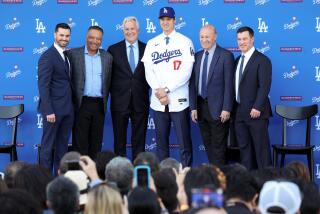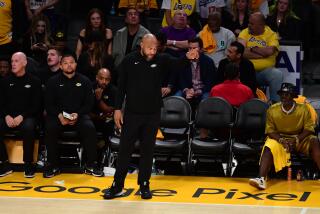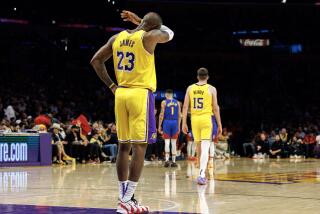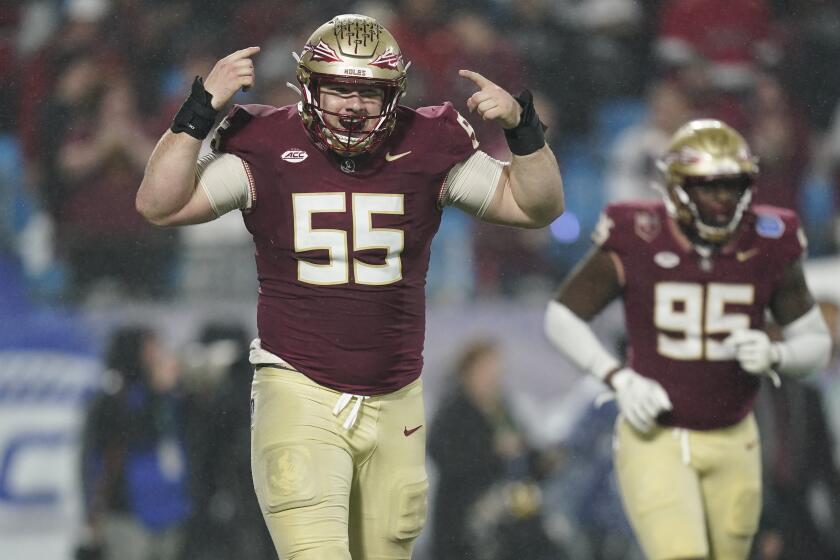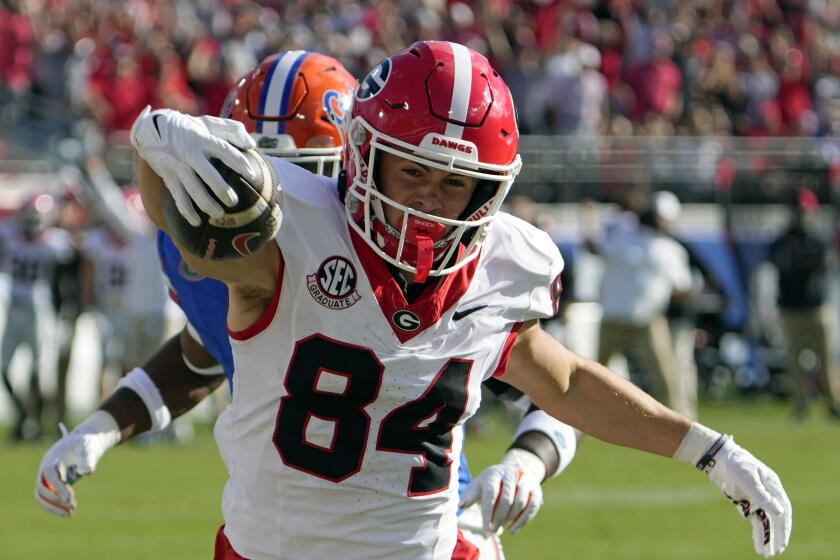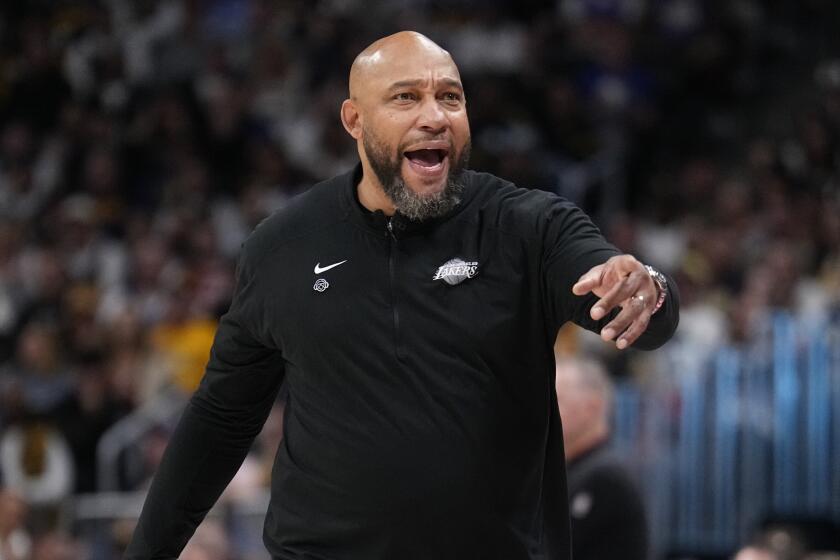Bush’s camp signals willingness to fight on
Halfway through his second season in the NFL, Reggie Bush already ranks among the most recognizable and profitable faces in the league.
For that he owes thanks to Mike Ornstein, the sports marketing agent who guided him to millions of dollars in endorsement contracts for products ranging from sneakers to submarine sandwiches.
Ornstein is also the man Bush fired last week.
“Most athletes hope for a shoe deal and a little something beyond that, but Bush has got it all,” one advertising executive said. “I don’t know why he would get rid of his agent.”
The split suggests something more than a business difference, with numerous sources pointing to a disagreement among Bush’s advisors over how to handle allegations that he and his family took cash and gifts while he was still playing at USC.
The principles are not doing much talking but, based on interviews and information gathered over several months, it seems clear that Bush’s advisors were split over whether to settle out of court with two would-be San Diego sports marketers who made the allegations.
From the beginning, Bush has denied that he and his family did anything wrong. His tough-talking attorney, David Cornwell, has shown little concern over an NCAA investigation into the matter, focusing instead on a lawsuit that recently arose from the claims.
Sources say that Ornstein, worried about public relations fallout, argued for bringing the matter to a quiet end.
Settlement proposals in the case date to at least the spring of 2006, a few days before the NFL draft. With Houston holding the first pick, an attorney for the erstwhile marketers, Michael Michaels and Lloyd Lake, told the Bush camp that Texans General Manager Charley Casserly had been calling to ask about the matter.
No deal was made and the Texans ultimately passed over Bush in favor of defensive lineman Mario Williams. Bush went second to the New Orleans Saints.
Later, Bush settled only with Michaels, paying him $200,000 to $300,000.
Michaels is a successful businessman who could have shown that he poured time and resources into the fledgling agency, New Era Sports & Entertainment, built around Bush as its first client. Bush’s family lived for a time in a house that Michaels owned. Michaels’ attorneys have claimed the family agreed to a monthly rent but never paid.
Lake was offered a lesser sum. Previously convicted of a felony, he had borrowed nearly $100,000 from his mother and sister to fund New Era, according to sources. Cornwell has repeatedly questioned his credibility.
New Era never got going because Bush signed with Ornstein’s Santa Monica-based agency in early 2006.
As a marketer, Ornstein would have been less interested in the legal merits of Lake’s case and more concerned about Bush’s public image. Therefore, settling with both Michaels and Lake would have made good business sense.
Bush could have written a check, signed Lake to a confidentiality agreement and the lawsuit would have evaporated.
There are additional allegations that Ornstein wooed the tailback with improper benefits, which the agent denies. Some have suggested that Ornstein was eager to settle the Lake lawsuit because he wanted to conceal his own wrongdoing.
Regardless, deals with both Michaels and Lake would have reduced the scope of the NCAA investigation, thereby reducing the chances that USC would have to forfeit past victories and Bush would have to give back his 2005 Heisman Trophy.
The running back would have nothing shadowing the goodwill he established through his well-publicized donations and efforts to rebuild flood-stricken New Orleans.
But Lake’s attorney, Brian Watkins, said that when the parties met before a mediator last summer, Cornwell walked away while Ornstein remained at the negotiating table.
“He’s the smart one,” Lake said.
Ornstein had no authority to strike a deal and, according to Watkins, Cornwell said he didn’t care if Bush lost the Heisman.
Cornwell, who declined to comment for this story, has continued to say that Bush is a victim of extortion and owes Lake nothing.
As for Ornstein, he recently limited his comments about the split with Bush, insisting their relationship remains close.
“I have a certain style about me and it’s just not the way he wanted to go,” he said. “Yeah, I’m disappointed. You’re always disappointed. But I love Reggie Bush.”
And Bush recommended Ornstein to former USC teammate Matt Leinart, who signed with the marketing agent last Thursday.
Whatever happened among Bush, his marketing agent and attorney, it appears that Cornwell’s line of reasoning prevailed. And the real winner could be the NCAA.
With no sign of a settlement on the horizon, Lake not only filed suit claiming he was owed more than $291,600 but also met with NCAA investigators who had struggled to gather information.
So far, no one has claimed USC knew of alleged improper benefits. Watkins said only that Lake would provide documents and other evidence implicating Bush and his family.
Cornwell could be banking on an assertion that Lake violated state law by acting improperly as an agent. That might affect the lawsuit, but not the NCAA investigation.
At least one marketing expert said that even if Bush were to experience a messy court battle and lose the Heisman, his national profile might not suffer drastically.
“It’s not steroids, not dogfighting, not murder,” said Bob Dorfman, a San Francisco advertising executive and author of the semi-annual Sports Marketers’ Scouting Report. “The NCAA has such arcane rules. . . . I think a lot of fans will say, ‘Ah, it’s just another case of them coming down on somebody for something that’s arbitrary.’ ”
Dorfman said USC fans might not agree if their football program is penalized. But with Ornstein out of the picture, it seems Bush has signaled a willingness to take that risk.
More to Read
Get our high school sports newsletter
Prep Rally is devoted to the SoCal high school sports experience, bringing you scores, stories and a behind-the-scenes look at what makes prep sports so popular.
You may occasionally receive promotional content from the Los Angeles Times.
